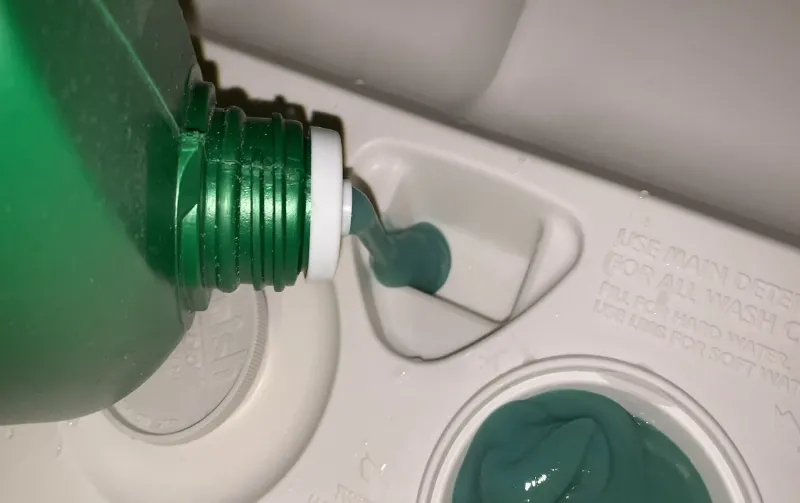Use one to two teaspoons (5-10 ml) of dishwasher liquid per load. This amount can vary depending on the size of the load and soil level.
A properly filled and maintained dishwasher is crucial for sparkling dishes and a well-kept kitchen.
Too little dishwasher liquid might not clean your dishes effectively, while too much could leave a residue.
It is essential to find the right balance to ensure your dishes come out clean and without streaks.
Your dishwasher’s manual often provides specific recommendations tailored to your model, which should serve as a guide when determining the correct amount of detergent.
Always opt for a high-quality dishwashing liquid designed for automatic dishwashers, as regular dish soap can produce too many suds and potentially damage the machine.
By following the manufacturer’s guidelines and adjusting for load size, you can keep your dishes spotless and your dishwasher running efficiently.

Finding The Right Measurement
Finding the Right Measurement for your dishwasher liquid is like hitting a culinary sweet spot.
It ensures your dishes come out spotlessly clean without wasting any detergent.
Just like a seasoned chef’s flair for seasoning, a meticulously measured dishwasher liquid can redefine the cleanliness of your dishes.
Manufacturer Guidelines
Start with the basics: consult your dishwasher’s manual.
Manufacturers know their machines best and provide a recommended detergent amount.
This information is often situated near the detergent compartment, offering a starting point for your dishwasher’s liquid dose.
Following Recommended Dosage
Believe in the wisdom of dishwasher liquid producers.
The recommended dosage on the bottle or package is crafted for average conditions.
Use this as an initial guide for filling your dishwasher’s detergent dispenser.
Adjusting For Water Hardness
Water hardness significantly influences the amount of dishwasher liquid required.
Hard water may necessitate a larger amount to combat mineral deposits, while softer water requires less.
Check your local water hardness and adjust accordingly.
Adapting Dishwasher Liquid Amount
Conditions vary and so should your detergent usage.
Factors such as the type of dishwasher liquid, the machine’s age, and efficiency can impact the required amount.
Experiment with the recommendations to find the ideal dose for your situation.
Considering Dishwasher Load
A full dishwasher may require more detergent, while a half-load might need less.
Match the detergent level to the number of dishes to maintain cleaning effectiveness and prevent wasted liquid.
Correlation With Liquid Dosage
Finally, understand the relationship between dishwasher performance and detergent dosage.
Insufficient detergent can leave dishes dirty, while excess can cause foggy glassware.
Striking the right balance ensures both clean dishes and a happy environment.
Frequently Asked Questions On How Much Dishwasher Liquid To Use
What Determines Dishwasher Liquid Quantity?
The amount of dishwasher liquid needed depends on the size of the load, the level of soil on the dishes, and the dishwasher’s specific instructions.
Can Too Much Detergent Damage A Dishwasher?
Using excess detergent can cause mechanical issues and leave residue on dishes. Follow your dishwasher’s guideline for optimal results.
Is Dishwasher Liquid More Effective Than Pods?
Effectiveness varies by brand, but liquid detergents offer adjustable dosage for different load sizes, potentially optimizing cleaning performance.
Does Water Hardness Affect Detergent Amount?
Hard water may require more dishwasher liquid to combat mineral deposits and achieve clean dishes without spots or residue.
Conclusion
Determining the right amount of dishwasher liquid is crucial for spotless results.
Remember, overuse can cause residue, while too little won’t tackle grease.
Follow your manufacturer’s guidelines and adjust based on water hardness and load size.
Embrace these tips for dishes that sparkle every time. Happy washing!

